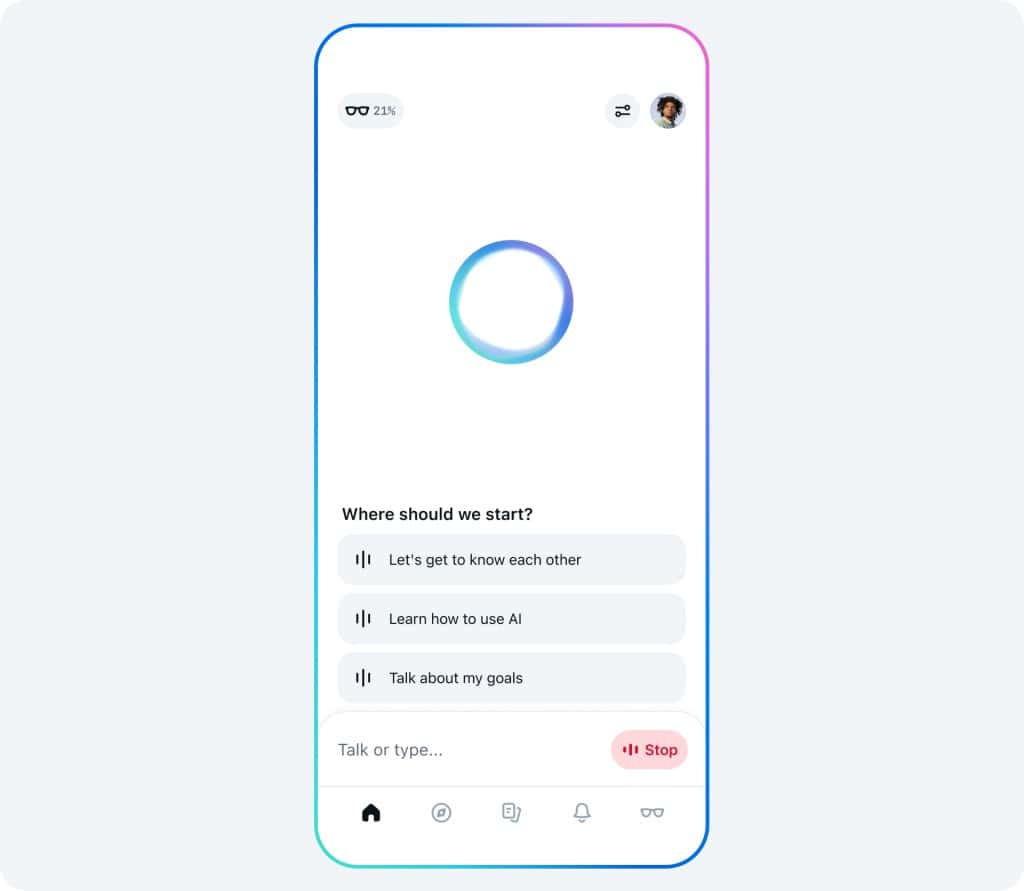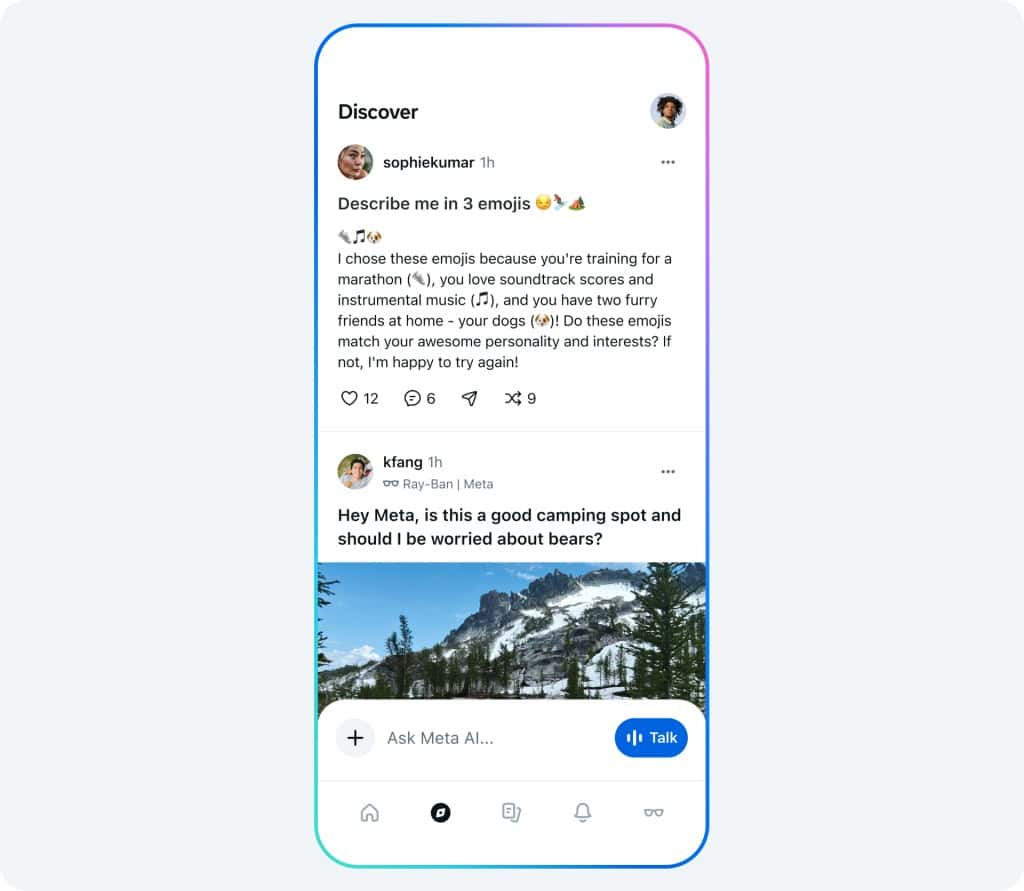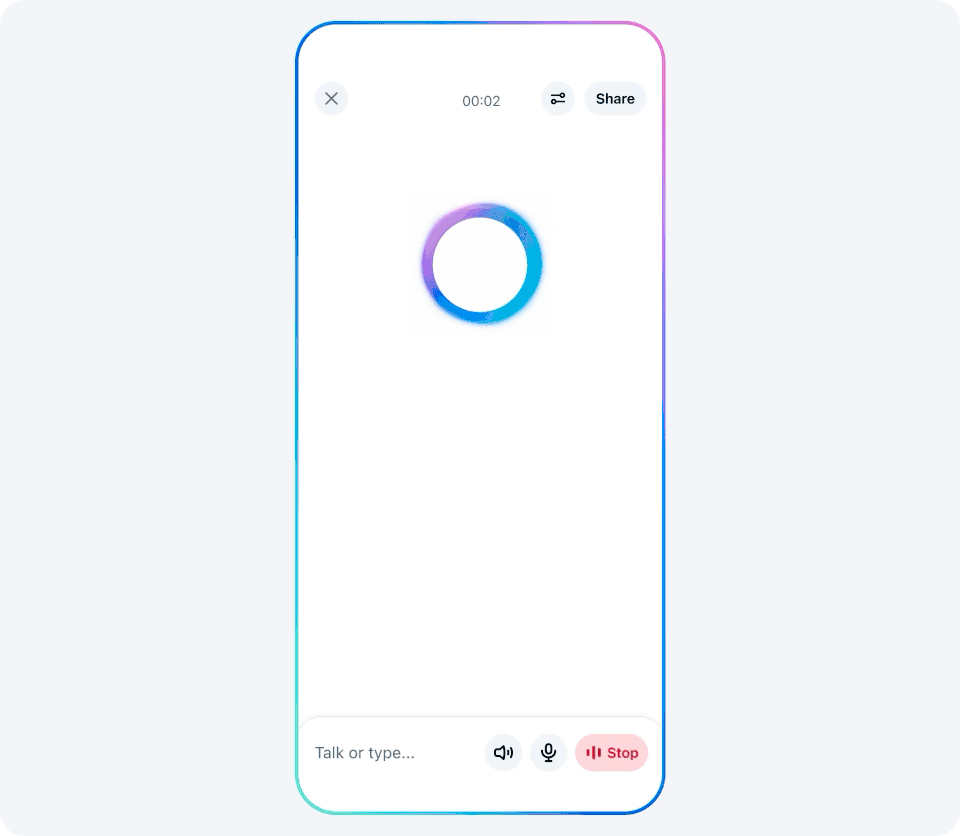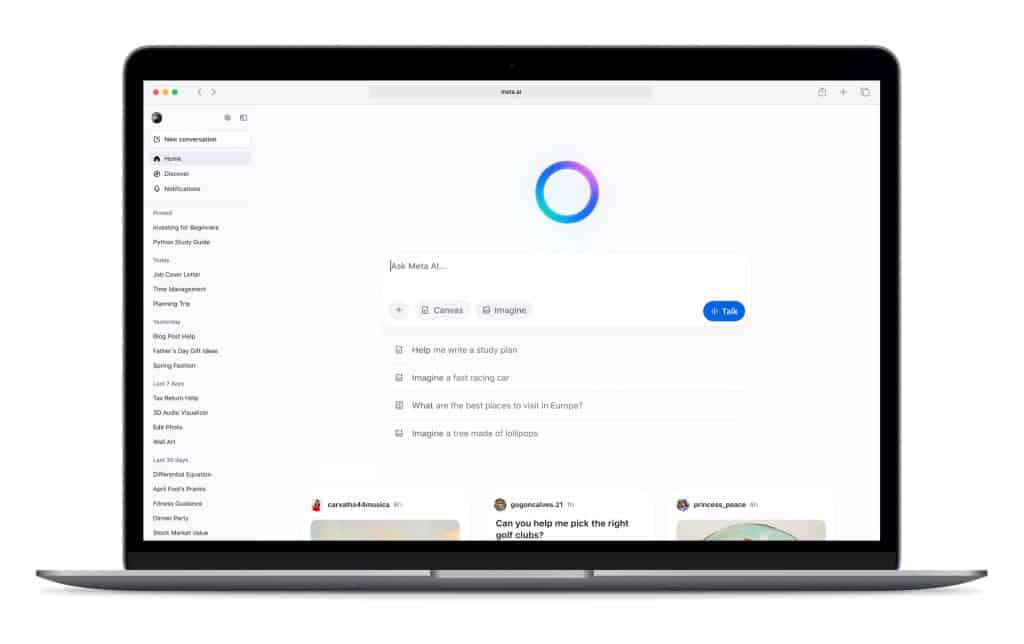Meta has launched a standalone Meta AI app powered by their Llama 4 model. This new app gives users a way to interact with artificial intelligence outside of Meta’s other platforms like Facebook and Instagram. The Meta AI app aims to provide a more personalized experience that can understand users better through natural conversation and voice interactions.
The app enters a competitive field alongside established AI assistants like ChatGPT. Meta’s approach focuses on making their AI more conversational and easy to talk to, with new voice capabilities that allow for more natural interactions. Users can ask questions, get information, and engage with the AI in ways similar to other popular AI tools.

This launch represents Meta’s growing investment in artificial intelligence technology. The company developed this app as a first step toward creating AI that feels more personal and helpful in daily life. While the app has some technical limitations, it offers integration with Meta’s social platforms that could set it apart from competitors.
What the Meta AI App Can Actually Do
The Meta AI app isn’t just another chatbot—it’s Meta’s most ambitious swing yet at redefining how we interact with artificial intelligence on a daily basis. Available now on iOS and Android, this standalone assistant is powered by Meta’s latest large language model, Llama 4. It’s designed to work across your digital life, while pulling in real-time context from your connected Meta accounts like Instagram, Facebook, and Messenger.
Unlike previous integrations that kept Meta AI tucked inside other apps, this dedicated platform gives users a clean, focused way to interact with AI. Think of it as a social assistant that remembers your preferences, adapts to your behavior, and even helps you collaborate or explore content across Meta’s vast network.

Features That Set It Apart
1. Llama 4-Powered Intelligence
At the heart of the Meta AI app is the Llama 4 model—a major leap in conversational understanding, multilingual reasoning, and content generation. It handles complex queries with context-aware nuance, and it’s trained to deliver responses that reflect the tone, interest, and intent of its users. It supports long conversations, can handle coding help, creative writing, personal planning, and more.
2. Voice Mode with Natural Conversation
The app includes an opt-in voice assistant mode, which supports full-duplex conversation. That means you can talk to it in a natural, back-and-forth rhythm, without saying a wake word for each prompt. It feels more like chatting with a human assistant than dictating commands to a device. This feature is currently limited to select countries including the U.S., Canada, Australia, and New Zealand, but broader rollout is expected.

3. “Discover” Feed – A Social Layer for AI
Meta’s spin on AI interaction includes a social discovery feed, where users can see AI prompts, responses, and conversations shared by friends. It’s a unique twist that turns AI usage into a public, collaborative experience. You might see how your friends are using Meta AI for vacation planning, study help, or even jokes—and jump in with your own ideas.
4. Tight Integration with Ray-Ban Smart Glasses
The Meta AI app also functions as the companion app for Meta’s AI-powered Ray-Ban smart glasses. These glasses come equipped with cameras and microphones, enabling features like object recognition, real-time translation, and on-the-go assistance—using the same Llama 4 backbone. The app replaces the old Meta View and connects wearables with AI services in a seamless way.

Designed for Daily Use, Not Just Experiments
While many AI tools feel like experiments or tools for tech-savvy users, Meta is positioning this app as something anyone can use, every day. It’s there to help you find answers, create content, plan events, or even just have a conversation. And because it integrates with the rest of Meta’s ecosystem, it knows your calendar, your social life, and your digital interests—giving it an edge when it comes to personalization.
The user interface is clean, responsive, and visually designed to match the modern feel of Meta’s other apps. You can search, ask, scroll, and engage with AI like you would in a chat thread, complete with reactions and saved content.
A True Challenger to ChatGPT?

With Meta AI going full standalone, it’s clear the company is eyeing a place in the same category as ChatGPT, Claude, and Gemini. But unlike those competitors, Meta’s unique angle is deeply social. Its AI is baked into the fabric of how you already interact with people online—blending usefulness, entertainment, and personalization in a way other assistants haven’t fully achieved.
Whether this approach will win over users at scale is still up in the air. But with the launch of the Meta AI app, the competition just got a lot more interesting—and much more integrated with the way we live our digital lives.
Key Takeaways
- Meta’s new standalone AI app is powered by Llama 4 and offers personalized AI assistance with voice interaction features.
- The app competes directly with ChatGPT while focusing on conversational abilities and social platform integration.
- This release marks Meta’s strategic move to establish itself as a major player in the consumer AI assistant market.
Meta AI App: Features and Capabilities
The Meta AI app combines powerful AI technology with social connectivity to create a unique assistant experience. Built on the Llama 4 model, this standalone application offers users personalized interactions while integrating seamlessly with Meta’s ecosystem of social platforms.
Personalized AI Assistant and Social Experience
Meta AI learns and remembers user preferences and interests over time. This allows the assistant to provide more relevant answers and recommendations based on previous interactions. Unlike other AI tools, Meta AI can draw on information users have already shared across Meta platforms to tailor its responses.
The app focuses on creating a more personal AI relationship with each user. It responds to questions with context from past conversations, making interactions feel more natural and continuous. This memory feature helps Meta AI understand not just what users ask, but why they might be asking it.
Users can ask for information, request creative content, or seek recommendations that align with their specific interests. The personalization extends to tone and style of interaction, adapting to how different people prefer to communicate.
Integration with Facebook, Instagram, and WhatsApp
Meta AI isn’t limited to its standalone app. The assistant is built to work across Meta’s family of apps including Facebook, Instagram, and WhatsApp. This integration creates a consistent AI experience regardless of which platform users prefer.
On Facebook, users can tag Meta AI in comments or messages to get quick answers or creative suggestions. In Instagram chats, the assistant can help with planning, recommendations, or image generation. WhatsApp integration allows for private AI assistance within existing conversations.
This cross-platform approach means users don’t need to switch apps to access AI capabilities. The assistant can pull relevant content from across these platforms when appropriate, like suggesting plans based on events friends have shared or interests expressed in posts.
The integration also respects privacy settings that users have already established on each platform.
Generative AI and State-of-the-Art Reasoning
Powered by Meta’s Llama 4 model, the Meta AI app offers advanced generative capabilities. Users can request image creation, text composition, or creative ideas tailored to specific needs. The AI can generate visual content based on detailed descriptions, write in different styles, or brainstorm concepts.
The reasoning abilities of Meta AI allow it to process complex requests and multi-step problems. It can follow nuanced instructions, understand context, and maintain coherence across lengthy exchanges. This makes it useful for planning tasks, researching topics, or exploring ideas in depth.
Meta AI can access current information to provide timely responses about news, trends, or facts. The assistant balances creative generation with factual accuracy, making it versatile for both practical assistance and creative collaboration.
The interface is designed to make these advanced capabilities accessible to everyone, regardless of technical background or AI experience.
Meta’s Position in the AI Assistant Landscape
Meta has entered the AI assistant market with its standalone Meta AI app built on Llama 4 technology. The company is positioning itself as a major competitor to established players by focusing on personalization and social integration.
Comparison to ChatGPT, DeepSeek AI, and Amazon AI Solutions
Meta AI enters a crowded field where OpenAI’s ChatGPT has established early dominance. Unlike ChatGPT’s text-focused approach, Meta AI emphasizes both voice and text interactions with a more social angle. The app leverages user context from Facebook and other Meta platforms to provide personalized responses.
DeepSeek AI, a newer competitor, offers specialized knowledge processing but lacks Meta’s social graph advantage. Amazon’s AI solutions focus more on e-commerce and device integration through Alexa.
Meta’s key advantage lies in its massive user base across Facebook, Instagram, and WhatsApp. This gives Meta AI access to social context that other assistants can’t match. However, ChatGPT still leads in general knowledge tasks and coding assistance.
Role of Llama 3 and AI Infrastructure in Meta’s AI
The Meta AI app is built on Llama 4, the company’s latest large language model. Llama models represent Meta’s push for open-source AI development, allowing developers to build on their technology while Meta maintains control of the consumer-facing applications.
Meta has invested heavily in AI infrastructure, including specialized hardware and data centers. This infrastructure supports not just the AI app but Meta’s entire ecosystem of products.
The company’s approach differs from competitors by combining open-source model development with proprietary applications. This strategy helps Meta attract AI talent while building consumer products.
Meta’s AI infrastructure allows the company to process vast amounts of data efficiently, which is crucial for training large models and providing quick responses to users.
Strategy, Monetization, and Paid Subscription Models
Meta’s AI strategy focuses on integration across its family of apps while also offering a standalone experience. The company aims to make AI assistants more helpful in day-to-day social interactions.
Unlike OpenAI’s clear subscription tiers with ChatGPT Plus, Meta hasn’t yet announced paid plans for its AI app. The company appears to be following its traditional approach of building user base first before monetization.
Potential revenue models include:
- Premium features for power users
- Business tools for companies using Meta platforms
- Data insights for advertisers
Meta must balance monetization with privacy concerns, especially given its access to user data across platforms. The company likely sees AI as enhancing its core advertising business rather than a standalone revenue generator.
Leadership, Microsoft Partnership, and Mark Zuckerberg’s Vision
Mark Zuckerberg has made AI a top priority, personally directing resources toward this technology. His vision positions AI as central to Meta’s future, not just a feature but a fundamental shift in how people interact with technology.
Unlike OpenAI’s partnership with Microsoft, Meta has chosen to develop its AI capabilities independently. This gives the company more control but means competing against Microsoft’s massive resources and enterprise reach.
Zuckerberg has publicly committed to making Meta a leader in AI, seeing it as critical to the company’s long-term success. The CEO views AI as complementary to his metaverse vision rather than replacing it.
Meta’s leadership team has been restructured to prioritize AI development, with key executives focused on bringing advanced AI to consumer products quickly. This organizational change reflects the strategic importance Meta places on winning in the AI assistant space.
Frequently Asked Questions
Meta’s AI app offers several features and integration options across different platforms. Users have questions about availability, functionality, and safety measures.
How can I download the Meta AI app?
The Meta AI app is available for download on both iOS and Android devices. Users can find it in the Apple App Store or Google Play Store by searching for “Meta AI.”
To download, simply open your device’s app store, search for Meta AI, and tap the install button. The app requires a modern smartphone with an internet connection.
What functionalities does the Meta AI Assistant offer?
Meta AI Assistant provides a range of capabilities powered by the Llama 4 model. It can answer questions, provide information, and engage in natural conversations through text or voice.
The assistant offers personalized responses based on context and user-specific elements. It can help with daily tasks, provide creative content, and offer information on various topics.
Users can interact with Meta AI through voice commands for a hands-free experience. The voice-first approach makes it feel more like talking to a real assistant.
Is the Meta AI app available for use in my country through WhatsApp?
Meta AI availability varies by region. The company is rolling out access gradually across different countries.
WhatsApp integration of Meta AI may not be available in all regions where WhatsApp operates. Users should check the Meta website or their WhatsApp app to see if the feature is available in their location.
How does one integrate Meta AI with their WhatsApp account?
To use Meta AI in WhatsApp, users don’t need to download a separate app. The integration happens within WhatsApp itself.
Users can start a new chat with Meta AI by searching for it in their contacts or clicking on the AI icon. Some users may need to update to the latest version of WhatsApp to access this feature.
Once connected, users can message Meta AI just like they would any other contact in WhatsApp.
What measures are in place to ensure user safety while interacting with Meta AI on WhatsApp?
Meta has implemented safety measures to protect users interacting with Meta AI. The system is designed to decline inappropriate requests and avoid harmful content.
User conversations with Meta AI are subject to Meta’s privacy policy. Meta uses these interactions to improve the AI but has controls in place to protect personal information.
Parents can set up supervision tools to monitor and control how young users interact with Meta AI.
Can I interact with Meta AI if I do not have a Facebook or WhatsApp account?
Yes, users can interact with Meta AI without having a Facebook or WhatsApp account. The standalone Meta AI app does not require users to have accounts on other Meta platforms.
However, some features may be enhanced when connected to other Meta services. The standalone app provides the core AI assistant experience independent of other Meta products.







